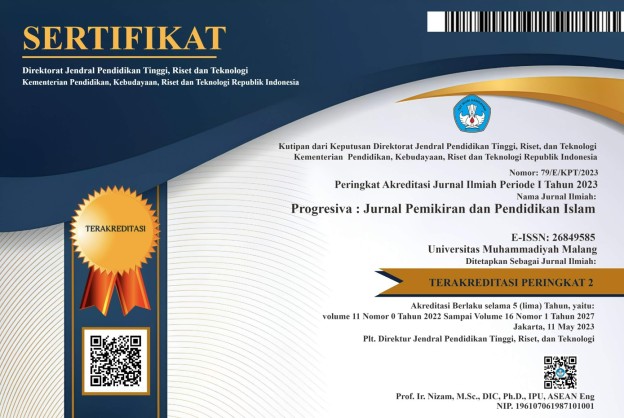Problems and Alternative Solutions for the Implementation of Islamic Education Learning during the Pandemic: A Literature Review
DOI:
https://doi.org/10.22219/progresiva.v10i1.17693Keywords:
Islamic education; Covid-19; problematic; SolutionsAbstract
This study aims to analyze the problems in the implementation of PAI (Islamic Education) learning, based on the results of preliminary research that the highest percentage of problems in the implementation of PAI learning is 44.4% internet network disturbances. This study uses a qualitative approach to the type of literature review by collecting information and data from various literature (scientific articles) through the google scholar journal search database, researchers enter the boolean operators "AND" and "OR" to specify the search for data. While the results of this study obtained 9 articles that provide alternative solutions to network problems including 1) finding a place that allows strong access; 2) replacing the cellphone card that can access the network better, 3) tethering with other family members; 4) applying to use the principle of flexibility in deciding policies and finding learning solutions during the COVID-19 pandemic; 5) doing tasks manually (limited face-to-face); 6) using the facilities provided by the Ministry of Education, Culture, Research, and Technology in the form of learning programs on television (TVRI); 7) providing data packets; 8) prepare the material manually, students take it at school and do it at home. 9) looking for a place with free Wi-Fi with health protocols; 10) giving more time in collecting assignments with the collection system at school or at the teacher's house. Therefore, the implementation of education needs to be supported by policymakers to continue to provide the facilities needed in the implementation of online learning, one of which is access to a stable network as an effort to achieve effectiveness and achieve educational goals.
Downloads
References
Abadi, M., & Muthohirin, N. (2020). Metode Cultural Responsive Teaching dalam Pendidikan Agama Islam: Studi Kasus Tindak Xenophobia dan Rasisme di Tengah Bencana Covid-19. Progresiva : Jurnal Pemikiran Dan Pendidikan Islam, 9(1), 34. https://doi.org/10.22219/progresiva.v9i1.12520
Abd. Basid. (2019). Pendidikan Islam Sebagai Way of Life; Refleksi Pencarian Spektrum Generasi Profetik. At- Ta’lim : Jurnal Pendidikan, 5(2), 97–109. https://doi.org/10.36835/attalim.v5i2.68
Anugrahana, A. (2020). Hambatan, Solusi dan Harapan: Pembelajaran Daring Selama Masa Pandemi Covid-19 Oleh Guru Sekolah Dasar. Scholaria: Jurnal Pendidikan Dan Kebudayaan, 10(3), 282–289. https://doi.org/10.24246/j.js.2020.v10.i3.p282-289
Asmuni, A. (2020). Problematika Pembelajaran Daring di Masa Pandemi Covid-19 dan Solusi Pemecahannya. Jurnal Paedagogy, 7(4), 281. https://doi.org/10.33394/jp.v7i4.2941
Bao, W. (2020). COVID-19 and Online Teaching in Higher Education: A Case Study of Peking University. Human Behavior and Emerging Technologies, 2(2), 113–115. https://doi.org/10.1002/hbe2.191
Bilfqih, Y., & Qomarudin, M. N. (2015). Esensi Pengembangan Pembelajaran Daring. Deepublish, January 2015, 1.
Brom, C., Lukavský, J., Greger, D., Hannemann, T., Strakova, J., & Svaricek, R. (2020). Mandatory Home Education During the COVID-19 Lockdown in the Czech Republic: A Rapid Survey of 1st-9th Graders’ Parents. Frontiers in Education, 5(July), 1–8. https://doi.org/10.3389/feduc.2020.00103
Cahyani, A., Listiana, I. D., & Larasati, S. P. D. (2020). Motivasi Belajar Siswa SMA pada Pembelajaran Daring di Masa Pandemi Covid-19. IQ (Ilmu Al-Qur’an): Jurnal Pendidikan Islam, 3(01), 123–140. https://doi.org/10.37542/iq.v3i01.57
Dewi, W. A. F. (2020). Dampak COVID-19 terhadap Implementasi Pembelajaran Daring di Sekolah Dasar. EDUKATIF : JURNAL ILMU PENDIDIKAN, 2(1), 55–61. https://doi.org/10.31004/edukatif.v2i1.89
Fahmi, M. H. (2020). KOMUNIKASI SYNCHRONOUS DAN ASYNCHRONOUS DALAM E-LEARNING PADA MASA PANDEMIC COVID-19. Jurnal Nomosleca, 6(April), 68–76.
Fauzi, M. F., Murdiono, M., Anindiati, I., Nada, A. L. I., Khakim, R. R., Mauludiyah, L., & Thoifah, I. (2020). Developing Arabic Language Instructional Content in Canvas LMS for the Era and Post Covid-19 Pandemic. Izdihar : Journal of Arabic Language Teaching, Linguistics, and Literature, 3(3), 161–180. https://doi.org/10.22219/jiz.v3i3.15017
Guswanti, M., & Satria, R. (2021). Problematika Pembelajaran Dalam Problematika Pembelajaran Dalam Jaringan (Daring) Pada Mata Pelajaran Pendidikan Agama Islam Di SMA Negeri 4 Pariaman. An-Nuha, 1(2), 116–124. https://doi.org/10.24036/annuha.v1i2.43
Handayani, L. (2020). Keuntungan , Kendala dan Solusi Pembelajaran Online Selama Pandemi Covid-19 : Studi Ekploratif di SMPN 3 Bae Kudus. Journal Industrial Engineering & Management Research, 1(2), 16. https://doi.org/https://doi.org/10.7777/jiemar.v1i2.36
Harahap, R. A., Assingkily, M. S., & Nalva, M. F. (2019). IBNU MISKAWAIH PERSECTIVE OF CHARACTER EDUCATION. 368–379.
Harahap, S. A., Dimyati, D., & Purwanta, E. (2021). Problematika Pembelajaran Daring dan Luring Anak Usia Dini bagi Guru dan Orang tua di Masa Pandemi Covid 19. Jurnal Obsesi : Jurnal Pendidikan Anak Usia Dini, 5(2), 1825–1836. https://doi.org/10.31004/obsesi.v5i2.1013
Jena, Pravarat Kumar. (2020). Online Learning During Lockdown Period For Covid-19 in India. International Journal Of Multidisciplinary EducationalResearch, 11(10), 659–664.
Jena, Pravat Kumar. (2020). Impact of Pandemic COVID-19 on Education in India. International Journal of Current Research (IJCR). https://doi.org/10.24941/ijcr.39209.07.2020
Kartika, M., Erik Aditya Ismaya, & Muhammad Noor Ahsin. (2021). Analisis Pembelajaran Daring di SD 2 Tenggeles Mejobo Kudus pada Masa Pandemi Covid-19. Lectura : Jurnal Pendidikan, 12(1), 41–56. https://doi.org/10.31849/lectura.v12i1.5906
Kusumah, A. F., Bariyah, O., Ramdhani, K., & Karawang, U. S. (2021). EDUKATIF : JURNAL ILMU PENDIDIKAN Penggunaan Google Classroom oleh Siswa dalam Pembelajaran Pendidikan Agama Islam di Masa Pandemic Covid 19. 3(5), 2874–2885. https://doi.org/10.31004/edukatif.v3i5.1011
Miles, M. B., Huberman, A. M., & Saldana, J. (2014). Qualitative Data Analysis A Methods Sourcebook (3rd ed.). SAGE.
Muhajir, A., & Muslimah. (2021). PERMASALAHAN DALAM PEMBELAJARAN ONLINE PADA ERA PANDEMI COVID-19 SERTA SOLUSINYA. Jurnal Iqtirahaat, 1, 11–17.
Mustofa, M. I., Chodzirin, M., Sayekti, L., & Fauzan, R. (2019). Formulasi Model Perkuliahan Daring Sebagai Upaya Menekan Disparitas Kualitas Perguruan Tinggi. Walisongo Journal of Information Technology, 1(2), 151. https://doi.org/10.21580/wjit.2019.1.2.4067
Nopiyanto, Y. E., Raibowo, S., Suryatama, R. Y., & Ibrahim. (2020). HAMBATAN GURU PENDIDIKAN JASMANI GENERASI 80-AN DALAM PEMBELAJARAN DARING DI TENGAH PANDEMI COVID-19. Jurnal Sporta Saintika, 5(September), 139–148.
Putro, S. T., Widyastuti, M., & Hastuti. (2020). Problematika Pembelajaran di Era Pandemi COVID-19 Stud Kasus: Indonesia, Filipina, Nigeria, Ethiopia, Finlandia, dan Jerman. Geomedia: Majalah Ilmiah Dan Informasi Kegeografian, 18(2), 50–64.
Rofi’ah, R. (2021). Problematika Orang Tua Mendampingi Anak Saat Pembelajaran Daring Di Masa Pandemi Covid-19 Dan Solusi Pemecahannya. Conseils : Jurnal Bimbingan Dan Konseling Islam, 01(01), 52–57.
Roni Hamdani, A., & Priatna, A. (2020). EFEKTIFITAS IMPLEMENTASI PEMBELAJARAN DARING (FULL ONLINE) DIMASA PANDEMI COVID- 19 PADA JENJANG SEKOLAH DASAR DI KABUPATEN SUBANG. Didaktik : Jurnal Ilmiah PGSD STKIP Subang, 6(1), 1–9. https://doi.org/10.36989/didaktik.v6i1.120
Sobron, A. ., Bayu, Rani, & S, M. (2019). Pengaruh Daring Learning terhadap Hasil Belajar IPA Siswa Sekolah Dasar Abstrak. Seminar Nasional Sains & Entrepreneurship, 1(1), 1–5.
Sugiyono. (2019). Metode Penelitian Kuantitatif kualitatif Dan R&D. Alfabeta.
Syarifudin, A. S. (2020). IMPELEMENTASI PEMBELAJARAN DARING UNTUK MENINGKATKAN MUTU PENDIDIKAN SEBAGAI DAMPAK DITERAPKANNYA SOCIAL DISTANCING. Jurnal Pendidikan Bahasa Dan Sastra Indonesia Metalingua, 5(1), 31–34. https://doi.org/10.21107/metalingua.v5i1.7072
Thoifah, I. (2018). Internalization Management of Religion Values Through Islamic Extracurricular Activities for The Establishment of Characters of Students of SMAN 1 MALANG. J-PAI: Jurnal Pendidikan Agama Islam, 5(1), 59–65. https://doi.org/10.18860/jpai.v5i1.5432
Umam, S. (2020). Pemilihan Stratregi Sebagai Alternatif Solusi Permasalahan Pembelajaran Berbasis Daring. AL HIKMAH: JOURNAL OF EDUCATION, 1(1), 35–46.
Wang, G., Zhang, Y., Zhao, J., Zhang, J., & Jiang, F. (2020). Mitigate the effects of home confinement on children during the COVID-19 outbreak. The Lancet, 395(10228), 945–947. https://doi.org/10.1016/S0140-6736(20)30547-X
Winarsieh, I., & Rizqiyah, I. P. (2020). PERANAN GURU DALAM PEMBELAJARAN DARING PADA MASA PANDEMI COVID – 19. 1(1), 1–9.
Yahya, M. S. (2006). Strategi Pendidikan Islam Menghadapi Kemajuan Iptek. INSANIA : Jurnal Pemikiran Alternatif Kependidikan, 11(1), 63–75. https://doi.org/10.24090/insania.v11i1.99
Yanti, M. T., Kuntarto, E., & Kurniawan, A. R. (2020). Pemanfaatan Portal Rumah Belajar Kemendikbud Sebagai Model Pembelajaran Daring Di Sekolah Dasar. Adi Widya Jurnal Pendidikan Dasar, 10(1), 61–68.
Downloads
Published
How to Cite
Issue
Section
License
Copyright (c) 2021 I'anatut Thoifah, Saeful Biantoro

This work is licensed under a Creative Commons Attribution-ShareAlike 4.0 International License.



















